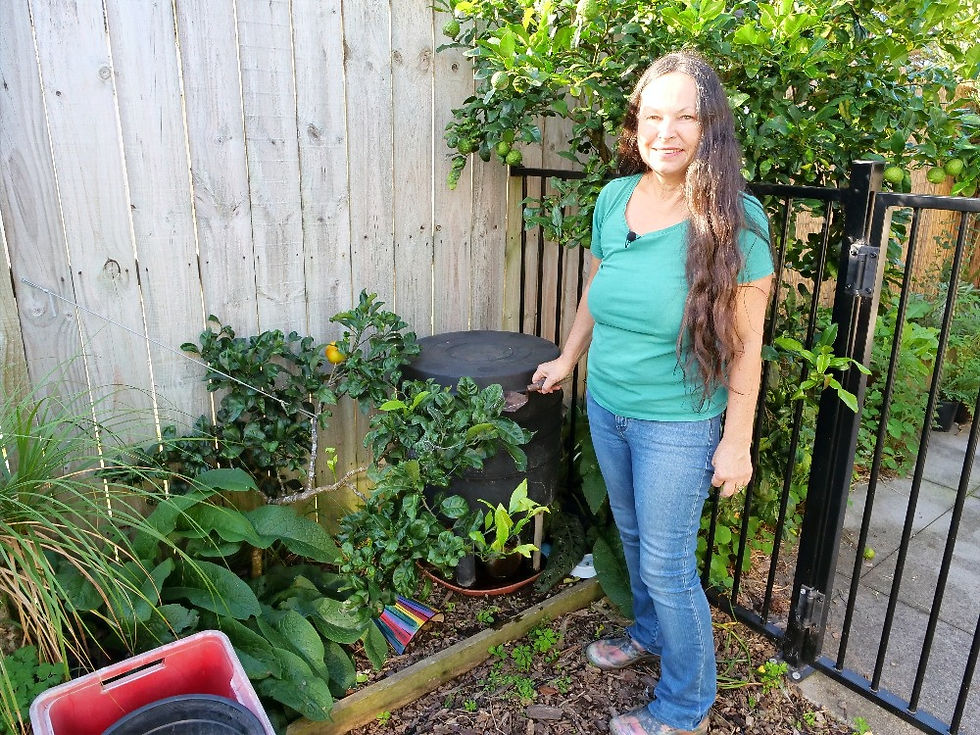Composting Solutions for Small Gardens
- Toni Kenyon

- May 28, 2021
- 3 min read

How can I compost in a small garden?
Contrary to what a lot of you may believe from looking at the photographs of my garden, I don't actually have a lot of space.
Composting takes up quite a reasonable portion of the back garden beds (well, a lot of space if you count the chook house).
You actually don't need a huge amount of space to turn your home garden (or patio/balcony space) into a closed loop system.
What do I mean by closed loop system?
I mean making sure that no organic material leaves the boundaries of your home.
I'm 'cheap' and I hate waste (not compost waste!) but I hate when I'm not using everything that I possibly can from my garden.
It is a no-brainer to me that I should find a way of reducing, re-using or recycling all of our organic waste.

What to do if you don't have chickens or a large area dedicated to compost?
If you're living in a small apartment, or you only have a small space dedicated to your growing area, you're not going to want to take up more space for composting your food scraps or your fresh vegetable waste.
What you need is a composting solution that:
• Works fast
• Is small
• Won't attract bugs or vermin
• Is easy to use and set up
Here are 5 solutions that might work for you:
Bokashi (Japanese Term Meaning “Fermented Organic Matter”)
Bokashi is Japanese for "Fermented Organic Matter". You mix your scraps (everything including meat, dairy and kitchen) in the Bokashi bucket with bran that has been inoculated with microbes.
Disclaimer: I've never used this system (hey! worms and chickens) but I understand that it's easy, clean and works really well in a small space.
You continue adding scraps until your bucket is full. Then you seal it and After 10-12 days you have "pre-compost" that can be left to break down further or put in a worm bin (more on worms below).
Apparently, you can also drain the bucket every couple of days while the 'brew' is fermenting and that makes a nice compost tea.
Worm Bin
I love my worms--I wrote about them here. I believe that a worm bin is an elegant solution for dealing with your organic waste.
Plastic Storage/Rubbish Bins
Rubbish bins are great because you can customize your bin to suit your space. They come in lots of sizes but a 30L to 50L rubbish bin would be an excellent choice.
You could even look at a wheelie bin.
You will have to drill some aeration holes either in the lid of your bin or near the top. Compost needs air and a dark coloured bin would also attract heat which will speed the composting process.
20-Litre Buckets
You can often pick these up for free from your local supermarket, or purchase them from your local plastic shop. You'll need to drill some holes in these too and the great thing is that they are also stackable.
Thick black plastic rubbish bags
You'll be amazed how quickly you can make compost in a black rubbish sack. Just put your scraps (and some shredded paper or cardboard, or old leaves or weeds from the garden) in the bag and seal it up. The microbes will get to work and you'll have amazing compost on your hands before you know it.
You need more than just food scraps for compost
You need greens (nitrogen materials--food scraps, grass clippings, weeds) and browns (cardboard, shredded paper, leaves) to make great compost.
What to Put in Your Compost:
• Vegetable and fruit scraps
• Shredded paper
• Coffee grounds
• Tea bags (but not if they're slimy)
• Leaves
• Garden trimmings
• Trimmings from houseplants
• Pet Hair (& your hair!)
• Cardboard cut up (as long as it's not shiny card or paper)
• Crushed egg shells
What Not to Put in Your Compost:
• Meat
• Dairy
• Any kind of fat
• Inorganic materials
• Avoid onion and garlic skins if your compost bin is inside
Tips for Excellent Compost in Small Spaces
The contents should be turned often. This keeps the microbes active and keeps the bins contents warming evenly. This helps to speed the composting process.
Have dry leaves or shredded paper handy. Add this to your bin when you add food scraps. This helps to keep the carbon to nitrogen ratio in check. It's a great use for any junk mail you get (as long as it's not shiny paper).
Keep your pieces small. Keeping your scraps small will increase the speed that the microbes can work on turning your waste into great compost.
I've composted before in much smaller spaces than I have now. It's great knowing that you're keeping your waste out of the landfill and making food for your garden--you're basically growing soil.
If you can't bring yourself to compost, then check around your neighbourhood for gardeners who are happy to take your waste.
I take the organic waste from a couple of other households and it helps speed up the composting process in my own backyard compost bins.
Love & Lettuce,
Toni xx








Comments